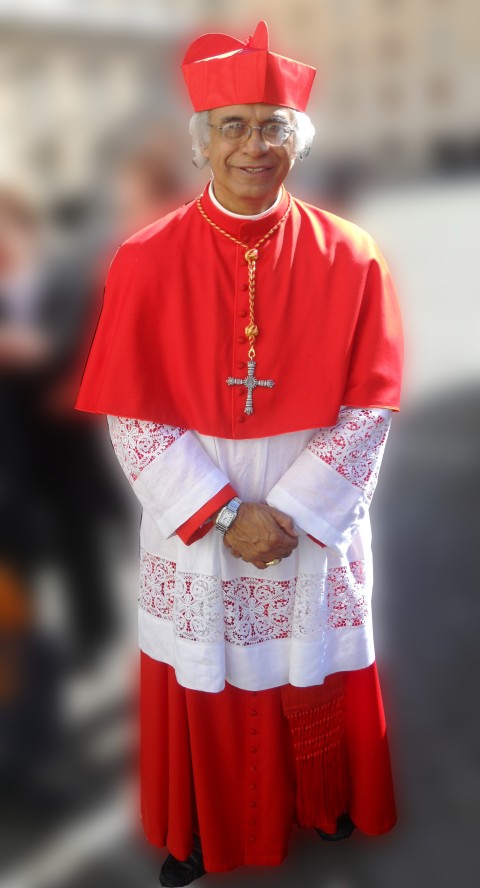Church acts as mediator in Nicaragua unrest, addresses corruption in Honduran government
Nicaraguan church leaders are among those decrying a violent response to protests. And in Honduras, a Jesuit-run radio station has charged the government with becoming a dictatorship.

On a grassy embankment in Managua, dozens of metal crosses with black flags honoring the dead and disappeared stood as a coda to more than a week of antigovernment unrest. Beside the memorial, protesters dressed in black chant, “They weren’t criminals, they were students!”
In late April thousands of people took to the streets to oppose social security reforms that would require workers to pay more and receive fewer benefits. Protesters and analysts say that the reform—later reversed by President Daniel Ortega—ignited the flame of frustration that’s been smoldering for the past decade as Ortega has centralized power, curbed media freedoms, and made his wife the vice president.
Read our latest issue or browse back issues.
The government’s violent response to what started off as small-scale student protests has led to nationwide calls for new elections, raising doubts over the political survival of Ortega and the Sandinista movement, which ousted a U.S.-backed dictator in 1979.
“The Sandinistas stopped being a revolutionary party long ago; it has forgotten its ethical principles and created an elite,” said Cirilo Otero, a sociologist and columnist for the national newspaper La Prensa. “The social security was just the trigger, and then this is the spontaneous combustion.”
As political tensions rose, the Catholic bishops agreed April 24 to mediate negotiations between the government, students, and other private sectors, including COSEP, the powerful business chamber that has largely stood by Ortega. Students initially refused to participate in the talks but agreed late the next day if the government met certain conditions, like investigating protester murders. The Catholic bishops’ conference convened a Peace and Justice mass demonstration on April 28, where Cardinal Leopoldo Brenes said the government had a month to address society’s demands.
Students gathered in front of a police line guarding El Chipote prison to call for the release of scores of young protesters who were detained without criminal charges over the previous week. Human rights groups are reporting that those in custody have been abused. Unarmed street protesters were beaten by police and pro-government militias, which Ortega claimed was the work of provocateurs trying to undermine him.
“Police reacted in an outrageous manner,” wrote Damaris Albuquerque, executive director of the Council of Protestant Churches of Nicaragua, in a statement. “We still don’t know how many have died, how many are wounded, detained, hurt.”
Sophia Paz, a college student waiting in front of the prison, sees the limits put on political rights under Ortega as echoing the rule of the dictatorship the Sandinistas overthrew in 1979.
“Our parents stood up and fought and now we need to,” she said. “People have let history repeat itself.”
Nicaraguans under the age of 35 make up nearly two-thirds of the population of 6 million, and their frustration over their educational and job opportunities has been building for years. Young Nicaraguans are also more likely to be digitally connected and to follow global political news. This is partly Ortega’s doing: public parks now offer free Internet access.
Students are calling for Ortega—who had been president in the 1980s and then again since 2007, having changed the constitution to allow him to return—to step down before the end of his current term in 2021. Even if Ortega agreed to early elections, there are no obvious opposition candidates at this point. Most students are disillusioned with political parties, saying they have no interest in running for office themselves, said Ricardo de León Borge, a political analyst in Managua. “If Ortega is smart about it, he could call early elections and play those divisions to his political advantage.”
Across Nicaragua’s northern border, in Honduras, dozens of people were killed and thousands arrested after the presidential election in late November, which many believe was stolen by the right-wing incumbent, Juan Orlando Hernández.
“Early election results showed a significant lead by Salvador Nasralla,” the opposition candidate, the World Council of Churches wrote. “However, the Supreme Electoral Tribunal, the TSE, dominated by magistrates who are loyal to the actual President Hernández, announced vote totals after many days and notable irregularities that gave the lead to President Hernández.”
Ismael Moreno Coto, a Jesuit priest who directs Radio Progreso, a station run by the religious order, has been outspoken about concerns of corruption. Within a few weeks of the election, Radio Progreso had one of its transmission towers brought down in what it sees as sabotage.
A statement published April 23 by Moreno Coto and others at Radio Progreso charges the Honduran government with becoming a dictatorship that uses “the state as business and for business deals.”
Moreno Coto has been the target of defamation endangering his life.
Moreno Coto told America, a Jesuit magazine, “I am convinced that [the defamation] is a campaign of stigmatization and criminalization against defenders of human rights and the opposition that originates in circles of the government itself.”
FOLLOWING UP (Updated August 21): Several hundred people, mostly civilians, have been killed in Nicaragua in four months of government crackdown against protesters—including students, business associations, and farmers’ organizations—challenging the increasingly authoritarian president. Catholic bishops have attempted to mediate in the crisis, but after they spoke out for protesters’ safety, President Daniel Ortega accused them of plotting a coup and storing weapons in churches, according to news reports. Armed supporters of the government have vandalized churches and in one case murdered a Protestant pastor and his family who refused to let snipers shoot at demonstrators from the third floor of their house.
In July, Cardinal Leopoldo Brenes and two other bishops were attacked by a mob. Silvio José Báez, auxiliary bishop of Managua, the capital, was cut on his arm and punched in the stomach, which he said was much less serious than what the Nicaraguan people are facing. “We continue to be pastors, and an authentic pastor of the Catholic Church will never side with the executioners,” Báez told the New York Times. “What there is here is an armed state against an unarmed people. . . . Being the mediators of a dialogue does not make us neutral before injustice, before human rights violations, before the death of innocents.”
A Nicaraguan Baptist, who requested anonymity for fear of retaliation, wrote that their church is helping families on both sides of the conflict, including those whose loved ones have been wounded, tortured, or disappeared, Baptist News Global reported. “Somehow, deep down, we feel we are being part of something big.” The peaceful struggle is for “a new Nicaragua, where there will be no more repression and violence, but where peace and justice will reign.”





